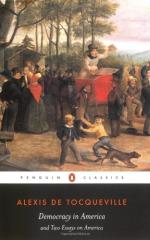
|
| Name: _________________________ | Period: ___________________ |
This test consists of 15 multiple choice questions and 5 short answer questions.
Multiple Choice Questions
1. What type of government does de Tocqueville say is "lurking behind every corner" for most citizens of the United States, assuming democracy failed?
(a) Republic.
(b) Aristocracy.
(c) Monarchy.
(d) Anarchy.
2. What type of regime does de Tocqueville believe is more oppressive than a dictatorship?
(a) A despotic monarchy.
(b) A tyrannical democracy.
(c) A tyrannical monarchy.
(d) A despotic democracy.
3. The tendency of people to implement equality first in the hope that freedom will follow is a what?
(a) Political ideology.
(b) Political truism.
(c) Political ideal.
(d) Political reflex.
4. What alone, according to de Tocqueville, is not a strong enough criterion to elevate an individual over the others?
(a) Ability.
(b) Strength.
(c) Intelligence.
(d) Wealth.
5. According to de Tocqueville, when men seek more equality and comfort, what do they tend to become?
(a) More different.
(b) More despotic.
(c) More alike.
(d) More tyrannical.
6. The army of a democratic country is equated, by deTocqueville, to what?
(a) A separate arm of the government.
(b) A separate state.
(c) A separate nation.
(d) A separate people.
7. De Tocqueville believes that the nations of his time cannot prevent the conditions of men from becoming _________________.
(a) Equal.
(b) Similar.
(c) Different.
(d) Varied.
8. The development of industry has led to an increase in what?
(a) Repetitive tasks.
(b) Division of labor.
(c) Working mothers.
(d) Working poor.
9. What does de Tocqueville see as the primary danger of democracy?
(a) Democratic freedom.
(b) Democratic despotism.
(c) Lack of community in a democracy.
(d) Freedom of expression.
10. Democracy counters individualism by insuring that common good is understood as what?
(a) Profiting everyone in the community.
(b) Profiting everyone who participates in the process.
(c) Profiting everyone who depends on each other.
(d) Profiting everyone who behaves as if he or she is free.
11. According to de Tocqueville, what drives the actions of every American man?
(a) Privilege.
(b) Women.
(c) Money.
(d) Rights.
12. In what country is every aspect of society in constant movement?
(a) England.
(b) Europe.
(c) France.
(d) America.
13. Who does de Tocqueville believe seeks exclusive comfort?
(a) The wealthy.
(b) Americans.
(c) Aristocrats.
(d) Political elite.
14. The relationship of the American aristocrat and workman is likened to a traditional aristocrat and what, according to de Tocqueville?
(a) Servants.
(b) Slaves.
(c) Peasants.
(d) Knights.
15. In America, what type of rank cannot be distinguished immediately?
(a) Societal rank.
(b) Political rank.
(c) Military rank.
(d) Economic rank.
Short Answer Questions
1. What does de Tocqueville say American workers constantly struggle with their masters for?
2. Governmental power in America is highly ______________.
3. What arm of the government, even in a democracy, tends to seek out war in de Tocqueville's observations?
4. According to de Tocqueville, total equality of people's condition would only be possible in a society where freedom is what?
5. What does de Tocqeville say is linked to--but not the same as--liberty?
|
This section contains 446 words (approx. 2 pages at 300 words per page) |

|




